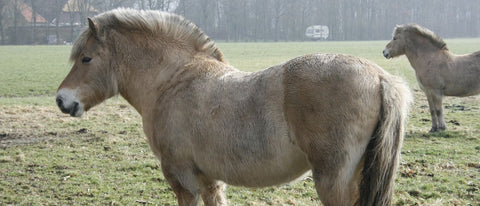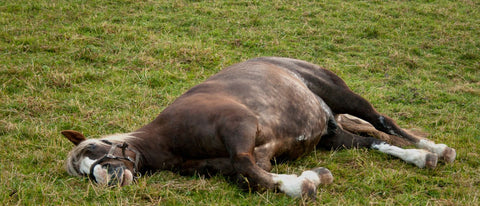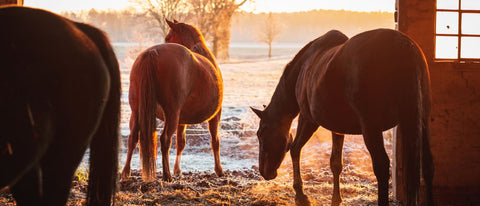
Florian ist aufgewachsen auf einem Bauernhof. Umgeben von Pferden, entdeckte er früh seine Faszination für diese majestätischen Tiere. Inspiriert von seiner reitbegeisterten Mutter, entwickelte er das Nahrungsergänzungmittel - Pferdegold. Seine tiefe Verbundenheit zur Natur und die leidenschaftliche Hingabe zu Pferden trieben ihn an, sein Unternehmen zu gründen.
The color, consistency, and smell of horse manure provide valuable clues about your horse's health and digestion. A healthy horse typically produces between 5 and 12 droppings per day.
Deviations or noticeable changes can be the first signs of digestive disorders, stress or feeding problems.
With regular observation and, if necessary, targeted feeding adjustments, you can identify health problems early on.
What are horse manure?
Horse manure is the excrement of horses. It consists of undigested food components , water , and a variety of intestinal bacteria – essential indicators of the condition of the digestive system. They provide insights
- in the degree of feed conversion,
- possible irregularities in feeding
- or health problems in the digestive tract.
Another important aspect is that horse manure shouldn't be viewed merely as a waste product. Rather, it provides valuable information about how well your horse is absorbing nutrients . This is crucial for responding to changes in health in a timely manner.
Monitoring horse manure is a simple yet extremely effective way to monitor your horse's health. It's good to know what constitutes healthy horse manure, what changes indicate potential problems, and how you can support your horse's digestion with targeted measures—for example, using Pferdegold® Digestive Happiness .

Pferdegold® Digestive Happiness
The Pferdegold Digestive Happiness dietary supplement is designed to stabilize your horse's physiological digestion. It contains probiotics and fiber, providing a high-quality supplement to a balanced diet.
Order nowHow often does a horse defecate?
The frequency of a horse's defecation varies and depends on several factors. Generally, a healthy horse defecates an average of 5-12 times per day .
Aspects such as:
-
Feeding type and quantity: A diet rich in fresh grass and hay ensures regular digestive processes.
-
Exercise: More exercise often leads to stimulated digestion.
-
Individual metabolism: Every horse has its own metabolism, which influences the frequency of bowel movements.
- Stress level: Stressful situations can lead to short-term changes – for example, a horse may suddenly defecate more or less frequently.

Normal frequency of defecation
As mentioned above, the normal number of bowel movements is 5-12 per day. This is a good guideline to follow. If you suddenly experience unusually frequent bowel movements, this could be a warning sign .
Factors influencing frequency
You may notice changes in your horse’s stool if, for example:
-
Type and amount of feed: A high proportion of fresh grass often leads to increased feces production.
-
Exercise: More exercise can stimulate metabolism and increase bowel movements.
-
Stress: Stress can lead to reduced digestive activity in the short term.
- Individual health status: If a horse becomes ill, this can lead to changes in the frequency and consistency of the stool.
What do healthy horse manure look like?
Observing the color, consistency and structure of horse manure provides numerous clues as to whether your horse is healthy.
Color of horse manure
Healthy horse manure is typically brown with a slight green tinge – this is due to the digestion of fresh grass and hay.
A consistent color pattern indicates a balanced diet . Altered colors, such as green, yellow, or even red and black, can indicate irregularities or health problems.
- Green horse manure can indicate that there is still a lot of fresh, undigested grass.
- Yellow horse droppings often indicate an increased proportion of straw or concentrated feed.
- Red or black horse droppings can signal bleeding in the digestive tract – in such cases, you should consult a veterinarian immediately.
Consistency & structure of horse manure
The consistency of healthy horse manure is firm , yet easily chewable . An ideal consistency indicates that your horse is receiving balanced hydration and is digesting effectively.
If the piles seem too hard or too soft, the rule of thumb is:
-
Piles that are too hard: This could indicate constipation or dehydration. Increasing fluid intake and checking the feed composition can help.
-
Piles that are too soft or mushy: These can be caused by digestive problems, stress, or a sudden change in diet.
- Watery diarrhea: A clear warning sign indicating acute intestinal problems. Consult a veterinarian immediately.
The internal structure of horse manure should be evenly fibrous . This indicates that the feed was well ground and efficiently digested.
What changes in horse manure indicate health problems?
Deviations from the above characteristics can be early warning signs of health problems.
Color changes
-
Green horse manure: A high proportion of fresh grass can be normal, but if the green portion becomes too dominant, the feeding should be reviewed.
-
Yellow horse droppings: An excessive amount of straw or concentrate may be necessary to meet the horse's needs, but this should be closely monitored.
-
Gray horse manure: A possible overdose of oil in the feed can lead to this change.
-
Red or black horse droppings: This is an acute warning sign. Blood in the stool indicates serious internal problems and requires immediate veterinary intervention.
Structural and odor-related abnormalities
In addition to color and consistency, the structure and smell of horse manure are also important. Unusual textures or a pungent, sour smell can indicate intestinal fermentation or inflammation of the gastric mucosa .
What to do if you notice unusual horse droppings?
If you notice any changes in your horse's manure, it is important to act quickly.
Here are some steps you can take:
-
Adjust feeding: Check the feed quality and quantity. If the stool is too soft or mushy, increasing the hay portion and reducing the amount of concentrate can help. Adjusting fluid intake is also essential.
-
Daily observation: Keep a simple diary in which you note the color, consistency, and frequency of stools. This allows you to identify trends and react to changes early on, as well as report them to your trusted veterinary clinic.
-
Consult a veterinarian: If you notice any sudden abnormalities or changes, especially if blood or unusual smells occur, you should consult a veterinarian immediately.
- Use supportive products: Supplemental feeds like Pferdegold® Digestive Happiness can help stabilize physiological digestion. This product contains valuable probiotics and prebiotics that can support the natural intestinal flora.
Pferdegold® Digestive Happiness: Support for healthy digestion of your pet
Pferdegold® Digestive Happiness is a specially developed dietary supplement that stabilizes physiological digestion. It contains an intestinal flora stabilizer, probiotics, and prebiotics —ingredients that optimize nutrient absorption.
Benefits of Pferdegold® Digestive Happiness at a glance
-
Stabilizes physiological digestion: Supports natural intestinal function.
-
Promotes intestinal flora: With a combination of probiotics and prebiotics that supports the balance of intestinal bacteria.
-
Improves nutrient absorption: Healthy digestion makes it easier to absorb nutrients from your food.
- Doping-free: Also suitable for tournament sports – the pellets can be fed before and during a competition.

Pferdegold® Digestive Happiness
The Pferdegold Digestive Happiness dietary supplement is designed to stabilize your horse's physiological digestion. It contains probiotics and fiber, providing a high-quality supplement to a balanced diet.
Order nowConclusion
Regularly monitoring horse manure is an essential part of your horse's health care. By analyzing the color, consistency, and structure of the manure, you can identify important clues about digestive health and potential health problems.
If noticeable changes occur, it is advisable to optimize feeding, increase fluid intake and initiate veterinary measures.
FAQ
What are horse manure?
Horse manure is the excrement of horses. It consists of leftover feed, water, and natural intestinal bacteria and provides important information about the horse's digestive process and overall health.
How often does a horse defecate per day?
A healthy horse typically defecates between 5 and 12 times a day. Variations can be caused by feeding, exercise, stress, and individual metabolic differences.
What to do if the horse manure is too hard?
Hard and dry horse droppings often indicate a lack of fluid intake or constipation. Increase water intake and check the composition of the feed. Increasing the hay content can also help.
When should I contact a veterinarian?
If you notice abnormal colors (e.g. red or black spots), a strong, unusual odor, or a sudden change in the frequency and consistency of your horse's droppings, you should consult a veterinarian promptly—especially if these symptoms persist for a longer period of time.
Important:
Pferdegold is not a substitute for veterinary diagnosis or treatment. The information contained in this article is for general informational purposes only and is intended to help improve your horse's well-being.
Pferdegold products do not treat or cure diseases, but rather support your horse in compensating for nutritional deficiencies through targeted nutrient intake.
However, they are not a substitute for professional advice from a veterinarian or specialist. If your horse has any health problems, we strongly recommend consulting a veterinarian. Pferdegold assumes no liability for decisions made based on the information provided here.
🐎 You want to read more about the intestines and health of horses:

















